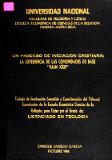| dc.contributor.author | Sariego García, Enrique | |
| dc.date.accessioned | 2020-11-09T21:51:53Z | |
| dc.date.available | 2020-11-09T21:51:53Z | |
| dc.date.issued | 1995 | |
| dc.identifier.other | 000095432 | |
| dc.identifier.uri | http://hdl.handle.net/11056/18578 | |
| dc.description | Licenciatura en teología | es_ES |
| dc.description.abstract | Estudia el proceso de iniciación cristiana de las comunidades de base “Juan XXIII” como proceso viable para nuestros tiempos. Esta investigación se basa en tres partes, la primera parte consiste en el estudio de aspectos antropológicos de otro tipo de iniciaciones humanas; en la segunda parte se centra en la experiencia de las comunidades de base “Juan XXIII” a través de una caracterización que recorre su historia, metodología de trabajo, praxis que realiza. La tercera parte, reside en el valor teológico y de la experiencia de las comunidades de base “Juan XXIII” como respuesta a una serie de desafíos que la fe y el mundo actual presentan y como propuesta nueva de vivir el seguimiento de Jesús. La metodología de la investigación se basa en dos etapas; la primera etapa es una estructurada de inspiración en el catecumenado cristiano, mientras que la segunda etapa es la vivencia como comunidad eclesial de base. Algunas de las conclusiones, es que la iniciación cristiana no es más que un modelo y el que se encuentre interesado por la fe y cuestiona a la comunidad por sus motivos de actuación, ambas partes están en constante cambio y enriquecen la relación con los conocimientos obtenidos. | es_ES |
| dc.description.abstract | It studies the process of Christian initiation of the base communities "John XXIII" as a viable process for our times. This research is based on three parts, the first part consists of the study of anthropological aspects of other types of human initiations; in the second part it focuses on the experience of the "John XXIII" Base Communities through a characterization that covers their history, work methodology, praxis that they carry out. The third part is the theological value of the experience of the "John XXIII" base communities as a response to a series of challenges that faith and the present world present and as a new proposal to live the following of Jesus. The methodology of the research is based on two stages; the first stage is a structured one inspired by the Christian catechumenate, while the second stage is the experience as a basic ecclesial community. Some of the conclusions are that Christian initiation is only a model and that those who are interested in the faith and question the community for its motives for action, both parties are constantly changing and enriching the relationship with the knowledge obtained. | es_ES |
| dc.description.sponsorship | Universidad Nacional, Costa Rica | es_ES |
| dc.language.iso | spa | es_ES |
| dc.publisher | Universidad Nacional, Costa Rica | es_ES |
| dc.rights | Acceso abierto | es_ES |
| dc.rights | Attribution-NonCommercial-NoDerivatives 4.0 Internacional | * |
| dc.rights.uri | http://creativecommons.org/licenses/by-nc-nd/4.0/ | * |
| dc.subject | IGLESIA CATÓLICA | es_ES |
| dc.subject | GRUPOS RELIGIOSOS | es_ES |
| dc.subject | CATOLICISMO | es_ES |
| dc.subject | CRISTIANOS | es_ES |
| dc.subject | CATHOLIC CHURCH | es_ES |
| dc.subject | RELIGIOUS GROUPS | es_ES |
| dc.subject | CATHOLICISM | es_ES |
| dc.subject | CHRISTIANS | es_ES |
| dc.title | Un proceso de iniación cristiana; la experiencia de las comunidades de base "Juan XXIII" | es_ES |
| dc.type | http://purl.org/coar/resource_type/c_7a1f | es_ES |
| una.tesis.numero | 2711 | es_ES |
| dc.description.procedence | Escuela Ecuménica de Ciencias de la Religión | es_ES |


